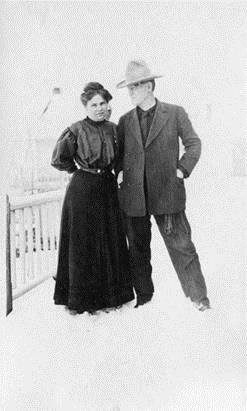
The adage “behind every successful man stands a good woman” has become an outmoded cliché. Nonetheless, it remains remarkably true for Montana’s favorite son, cowboy artist Charlie Russell, whose wife, Nancy Cooper Russell, was instrumental in his success. In fact, while Nancy “stood behind” her husband in terms of providing nurture and support, when it came to managing the business aspects of his career—and earning him international fame in the process—she was fully out front. As Charlie’s nephew, Austin Russell, noted, “[S]uccess came tapping at the [Russells’] door or, rather, Nancy dragged success in, hog-tied and branded.”
Nancy Cooper Russell’s story would in many ways befit a Horatio Alger novel. She was born in 1878 into meager circumstances on a Kentucky tobacco farm after her father, James Cooper, had abandoned her then-pregnant mother, Texas Annie Mann. In 1890, Nancy moved to Helena, Montana, with her mother, half-sister, and her mother’s second husband, James Allen. Thereafter, Allen was most often absent, so Texas supported her daughters by taking in sewing and laundry. Eventually, Nancy hired out as a housekeeper as well.
Texas died in 1894 following a lengthy illness. After the funeral, which Nancy arranged and paid for, Allen returned to Helena, staying only long enough to claim Nancy’s half-sister, Ella. He left sixteen-year-old Nancy to fend for herself. At the recommendation of one of her mother’s former customers, Ben and Lela Roberts—a Helena couple who had relocated to Cascade—hired Nancy to serve as their live-in housekeeper and help care for their three young children. Years later Nancy would recall her excitement when, in the fall of 1895, she learned that the Roberts were expecting a special dinner guest: a former cowboy who had an established reputation as both an artist and a hellion. Eleven months later, Charlie and “Mame,” as he always called Nancy, were married in a ceremony held in the Roberts’s home. The following year, the newlyweds moved permanently to Great Falls believing that the larger city would offer them greater opportunities. Continue reading Behind Every Man: Nancy Cooper Russell